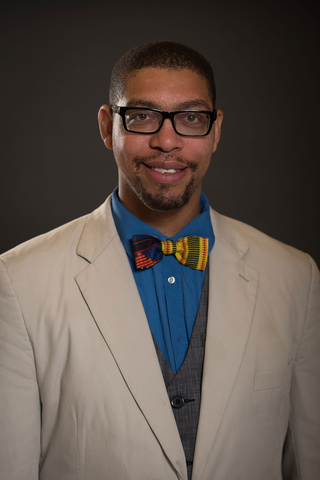
“Is it basketball? Is it watching TV? Is it singing?” Hinton says. “I ask people: Have they ever thought about the math or the physics behind the shot? What do they think about in the context of communicating with other people? Have they ever thought about the acoustics behind singing? I connect on that level.”
Hinton, a postdoctoral research fellow in the Department of Internal Medicine, studies mitochondria and how they’re regulated by insulin stimulation and skeletal muscle. In addition to his full-time lab work, Hinton has worked for three years as an academic and career development instructor in the UI Carver College of Medicine’s Office of Diversity, Equity, and Inclusion.
“I go out and I give group development talks about understanding what diversity really means and how mentors can better prepare themselves to be excellent mentors to diverse people,” he says.
Hinton’s presentations have taken him to conferences and universities all over the country, and he says those events count as an important part of his own career development.
“Conferences reinvigorate me to be able to mentor and also teach and inspire others to think about diversity,” he says. “We're trying to create a change of direction toward what scientists look like and what people think of the norm of when they look at a scientist.”
Considering the arts in sciences
As a mentor, he also discusses the context of psychology and sociology, how those behavioral sciences translate back to family, and how they’re important in STEM, as well. Hinton’s goal is to open people's minds to different types of thinking, stressing that everyone should consider science because it affects all disciplines, including the arts.
“I want to teach people that [science and the arts] are one and the same, just as the melody you play inside your head is what inspires you to act upon a STEM field or an arts field,” he says. “You're already thinking about science innately, so why not apply it to a concept and ask a question?”
Hinton says he’s learned many important things by devoting his time to mentoring and to STEM diversity.
“You learn how to pay it forward, but you also learn how to pay back into yourself,” he says.
It all began in the garden
Hinton hails from North Carolina and it was there, in third grade, that he remembers first gardening with his grandparents. The trio planted and grew pumpkins, butternut squash, watermelon, sunflowers, green beans, and tomatoes. He remembers other botanical treasures: a grape vine, a sage brush, and a tree yielding lush blackberries and raspberries. Hinton would visit the garden each day to see how the flowers transformed into fruits or vegetables.
That tradition continued until he left for college.
“My grandfather taught me the basic concepts of seeds and how they grow. I continued to love botany all the way through undergrad and ended up not only studying botany, but actually looking at the mechanisms of fruit ripening at Duke,” he says. Hinton went on to study what happens with the pathophysiology between plant host interactions.
Today, among other research, he’s seeking a site-specific target that could be accessed for a new drug treatment for diabetes, one that regulates miscommunication between mitochondrial-associated membranes.
“I think that the novel progress that we're making will be able to help move the field forward as a whole, towards being able to come up with a treatment that will stabilize diabetes hopefully sooner rather than later,” he says.
He knows his scientific spark was ignited by some very special mentors of his own. Hinton may never have become a scientist “if not for my grandparents inspiring me to take the time out of my day to think about a plant and how it grows,” he says.
By nurturing students’ interest in STEM fields, Hinton hopes to grow the number of Black scientists nationwide. One way that he has approached this goal has been to recognize existing Black scientists who are leaders in their fields. After one of his STEM research talks, Cell Press reached out to him for help developing a list of inspiring Black scientists.
Hinton learned recently that he was named to a prestigious list, as well.
The blacklist100 was created to amplify emerging voices within the Black community representing bold, innovative, and culture-making thought-leadership. These experts, according to the list, represent a starting point for action.
“I was flabbergasted when I found out. I didn't even know that this was happening,” Hinton says.